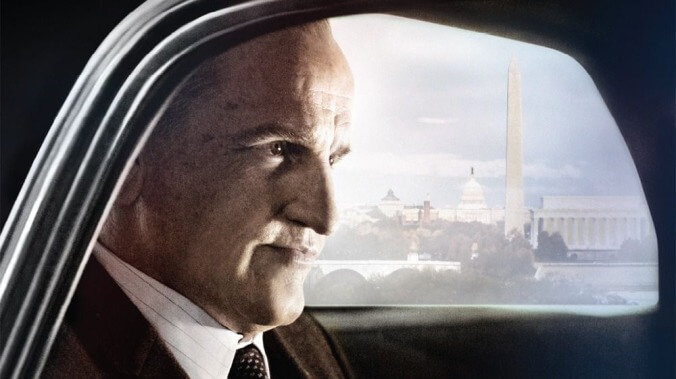Woody Harrelson’s makeup isn’t the worst thing about LBJ

Rob Reiner’s LBJ hides Woody Harrelson under prosthetics and make-up. The result looks terrible, like a fish-lipped Dick Tracy villain with an elephant’s ears. Is this really supposed to be Lyndon B. Johnson, the guru of Senate politics who misread the first modern primary? The president who created the largest array of social programs this side of the New Deal, only to shove America into the Vietnam War? Johnson the narcissist, the bully, the failure, the sphinx? Robert Caro’s Johnson? The only thing this wax-museum biopic is equipped to handle is the man’s crudity, though the shock value of a political leader saying “fuck” and “titties” and going on about his manhood has deprecated somewhat in the last year. Besides, the gross-out cowboy routine that is part of Harrelson’s performance is the opposite of humanizing; the proverbial average American can relate to taking a dump with the door open in full view of one’s subordinates about as well as they relate to the court of Louis XIV. They had bad wigs there, too.
There’s recently been a glut of portrayals of Johnson: Bryan Cranston in All The Way, Tom Wilkinson in Selma, John Carroll Lynch (more briefly) in Jackie, and so on. But it’s debatable whether LBJ even has an opinion on the man whose career and presidential legacy embody so many of the contradictions and flaws of American liberalism. They speak, too, to a couple of general human truths: that we are driven by contradictions, and that the closer we get to power, the more stock we put in our insecurities. Yet LBJ underplays both its title character’s progressivism and his faults. Its version of the Texan president’s mercurial personality involves Harrelson clodding around in Frankstein’s-monster lift shoes and swinging his arms (he’s way too short for the role) while pouting, clowning, and gobbling sweets, coddled by Jennifer Jason Leigh’s witch-nosed Lady Bird Johnson. This is definitely the wrong Commander In Chief to portray as an overgrown grumpy toddler, but that’s how Joey Hartstone’s simplistic script often characterizes him.
Employing a pointlessly jumbled structure (currently de rigueur for public-figure biopics), LBJ hits the class-presentation points of Johnson’s rise to the nation’s highest office: the fiasco of his campaign for the Democratic presidential nomination; John F. Kennedy’s narrow victory in the 1960 election, with Johnson as his running mate; the deep, mutual contempt between Johnson and Bobby Kennedy (Michael Stahl-David); JFK’s assassination, which vaulted Johnson into the presidency; the Civil Rights Act Of 1964. Each of these episodes contains enough petulance and hubris to be its own movie (the last one was dramatized in the recent-ish All The Way), but LBJ reduces them to clips of old black-and-white news footage and static exchanges between Johnson and assorted aides, speechwriters, and members of the Kennedy family. The writing bears the tell-tale mark of bad biographies, intentionally overlooking the problematic instead of cross-examining.
Is it funny? In stretches, when it lets Harrelson play Johnson as a schemer and opportunist, the twinkle in his eyes escaping through horn-rimmed glasses and colored contact lenses. Reiner hasn’t completely lost his gift for comedy (This Is Spinal Tap and The Princess Bride remain his best films), but neither has he gained a talent for drama. At best, his camera style is functional. At worst, it betrays LBJ’s joyless and unresourceful cheapness: the bland and awkwardly limited sets, the small crowds, the bad effects. To make matters worse, the role of John F. Kennedy is played by the Jeffrey Donovan, who played Bobby Kennedy in J. Edgar; his Mayor-Quimby-with-lockjaw has the power to cut a scene’s apparent production value in half. Jackie, which was made on a quarter of this movie’s budget, had the smarts to embrace claustrophobia as a perspective on fame and power. LBJ can barely map a room with the camera, let alone get under the creased, rubbery skin of Harrelson’s lead performance.
Johnson could be racist in private. LBJ plays this off as performance, though the truth was more complicated. Tackling it would involve an interrogation of the American liberal political class—always cozier with the right wing than with the left—that Reiner has no interest in mounting. Instead, LBJ offers a Kennedy-ite interpretation of Johnson as a man who had a moral awakening after inheriting the administration of the martyred JFK, as though he jumped up one morning and bellowed, “Eureka! Civil rights!” (Never mind Johnson’s damned political beliefs.) This it conveys through his relationship with the segregationist Georgia senator Richard Russell (Richard Jenkins, giving the most naturalistic performance in the film despite a wavering accent), whom Johnson initially courts for support and then rebukes. It’s almost sadistic to cast Jenkins, the actor who most resembles Johnson, in a supporting role in LBJ. His scenes with Harrelson suggest a man talking to his own Halloween-mask likeness.